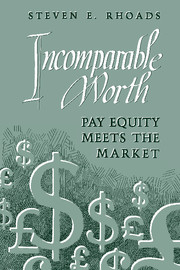Book contents
- Frontmatter
- Contents
- Acknowledgments
- 1 Introduction
- 2 The debate over equal pay for comparable worth
- 3 Implementing comparable worth in Minnesota
- 4 Job evaluation in Minnesota localities
- 5 Equal pay for work of equal value in the European Community
- 6 Equal pay for work of equal value in the United Kingdom
- 7 Equal pay for work of equal value in Australia
- 8 Conclusion
- Appendix: a note on the research and presentation of findings
- Notes
- Index
3 - Implementing comparable worth in Minnesota
Published online by Cambridge University Press: 06 July 2010
- Frontmatter
- Contents
- Acknowledgments
- 1 Introduction
- 2 The debate over equal pay for comparable worth
- 3 Implementing comparable worth in Minnesota
- 4 Job evaluation in Minnesota localities
- 5 Equal pay for work of equal value in the European Community
- 6 Equal pay for work of equal value in the United Kingdom
- 7 Equal pay for work of equal value in Australia
- 8 Conclusion
- Appendix: a note on the research and presentation of findings
- Notes
- Index
Summary
In their research on comparable worth, Sara Evans and Barbara Nelson find that states which pass such laws typically have public-sector collective bargaining, Democratic control of state politics, and energetic commissions on the status of women. Minnesota had all these as well as a strong progressive tradition; a politically astute branch of the American Federation of State, County, and Municipal Employees (AFSCME); 154 women's organizations; and feminist (not just women's) caucuses in both major parties. Moreover, as important for the passage of comparableworth legislation as any one of these was Minnesota's position as one of the first states to act, so that events transpired at a time when few knew anything about the issue and opposition forces had not mobilized.
In the late 1970s, Minnesota evaluated the state's personnel system. As a part of the evaluation Hay Associates did a study of salary and benefit policies, which included job evaluation point totals for 762 multiincumbent job classes. Under prodding from Nina Rothchild, the executive director of the Commission on the Economic Status of Women, Hay did a brief analysis comparing male-dominated and femaledominated job classes. Hay reported a “slight tendency” to pay maledominated classes at a higher rate than female-dominated classes, but considered the finding of no significance.
Searching for ways to improve the economic status of women, Rothchild and fellow staffer Bonnie Watkins decided to look again at the relationship of points and pay for male- and female-dominated jobs. Watkins says they began pessimistically, expecting the Hay system to have produced a study justifying the status quo favoring male-dominated positions.
- Type
- Chapter
- Information
- Incomparable WorthPay Equity Meets the Market, pp. 41 - 79Publisher: Cambridge University PressPrint publication year: 1993



